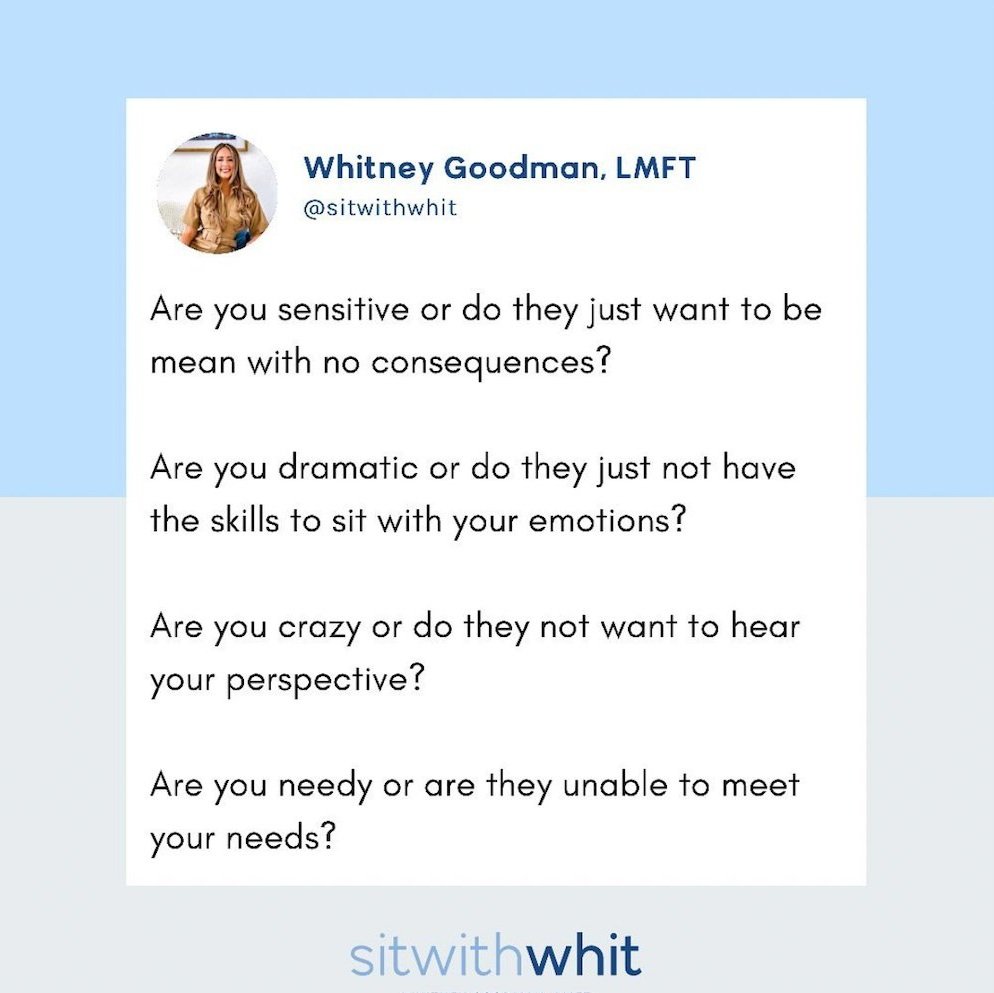The 8 Phrases Used By Narcissists To Make You Feel Crazy
by Audie Metcalf
Listen. This is a big topic on the internet. And for good reason. We wrote about it ourselves here and here. Oh, and here. Oops, here and here too.
So we are firmly, FIRMLY on the side of taking this seriously, and giving a forum for people on the receiving end of this behavior to talk about their experiences.
But it’s also complicated.
Because we can’t just trot out the word “narcissist” when someone is being a jerk or being self-centered or saying something we don’t agree with. So we wanted to identify very specific phrases that are absolutely at least narcissist-adjacent, and can really crush a person’s sense of self during conflict.
Maybe they’re said to you. Maybe you say them to others. Maybe seeing some of them here in black and white will help you to create better boundaries. Which is…another hot topic that we wrote endlessly about here and here and here because they’re so unbelievably hard!
Ok, let’s go.
1. “I never said that!”
God, this one. Doesn’t it make your head explode? If you grew up with parents who said this all the time, you likely just lived in a perpetual state of feeling gaslit without knowing that word so YOU felt crazy, insane, and like the black sheep. It’s a truly maddening feeling, and eventually, we start to doubt ourselves. Maybe they…didn’t say it, we think eventually. Nah. They did. Because if they hadn’t actually said whatever it was, they would likely say something like “I’m sorry I didn’t mean that because it doesn’t at all reflect what I really think.”
2. “I’ve forgotten more about X than you’ll ever know.”
This one isn’t on any of the typical “they’re a narcissist!” lists which is exactly why we chose it. It’s a very specific kind of attack that is steeped in comparative language to create a power dynamic where they’re the “better” one. Because narcissists treat you how they feel about themselves. Aka, they feel small, so they have to make you feel small.
3. “Ok, I guess I just won’t say that to you anymore.”
Here’s a subtle way to make it about YOU, when you express your authentic feelings about something. Instead of apologizing that it’s hurtful, they imply it’s something about you so they won’t do it around you. Crazy-making!
4. “Why are you being so dramatic?”
So common! But if you think about it, if what we’re expressing prompts them to say that, doesn’t it mean we’re probably talking about something we’re emotional about? And whether it’s being devastated that there aren’t any Formula 1 Halloween costumes for dogs available on Amazon OR crying about missing our family during Covid, is it on them to quantify the level of our emotions? No. And the reason they’re doing it is about them. Not us. Which again means our experience isn’t really part of their equation. Their REACTION to our experience is all they’re interested in quantifying.
5. “You’re being way too sensitive about this.”
Maybe we are being too sensitive about it. But if that’s the case, wouldn’t loving, kind people get curious about where that sensitivity is coming from, instead of weaponizing it to make us feel terrible about our challenges? When people pounce on our weaknesses in close relationships, they’re taking every chance they can get to position themselves back into their perceived position of power. Which is, without question, a result of narcissistic wounding.
6. “You’re the ONLY person I have these problems with.”
This is often said by a spouse and it’s wildly unhelpful because our closest relationships are of course where our deepest conflicts emerge. This is designed to make YOU feel like “the problem.”
7. “I only said that because of what YOU DID.”
Shifting blame is a really classic narc maneuver. The second you hear it (or say it), you can immediately know it means someone is taking zero responsibility.
8. “You always just need to fight don’t you?”
This kind of response is used to sound “totalizing” but it has no place in an argument or conflict about a single issue—any single issue can be turned into these “this is who you are” kinds of statements designed to make the person question themselves and their right to express their needs.
A lot of what we see on the Internet is about how “narcissists can’t change” and to “cut them out of our lives immediately,” but we don’t necessarily subscribe to this binary. Mannnnnny of us have deep narcissistic wounding because we were raised by narcissists, but there’s more information now, there are articles like this where we can seek out kinder, more human interactions. And we can be fully informed as kids or partners or friends of narcissists.
And we can do better.
We can demand more. Of others, and of ourselves.
And sometimes, we can walk away.
Audie Metcalf is the Editor-in-chief of The Candidly, and lives in LA with her family. You can find more of her articles here.
This article is for informational purposes only. It is not intended to be used in place of professional advice, medical treatment, or professional care in any way. This article is not intended to be and should not be a substitute for professional care, advice or treatment. Please consult with your physician or healthcare provider before changing any health regimen. This article is not intended to diagnose, treat, or prevent disease of any kind. Read our Terms & Conditions and Privacy Policy.








